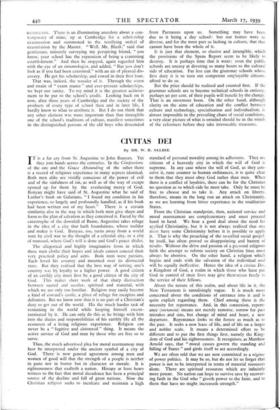CIVITAS DEI
By DR. W. B. SELBIE
IT is a far cry from St. Augustine to John Bunyan. Yet they join hands across the centuries. In the Confessions of the one and the Grace Abounding of the other there is a record of religious experience in many aspects identical. Both men alike are vividly conscious of the power of evil and of the sinfulness of sin, as well as of the way of escape opened up for them by the everlasting mercy of God. Bunyan might have said of St. Augustine what he said of Luther's book on Galatians, " I found my condition in his experience, so largely and profoundly handled, as if his book had been written out of my heart." There is a certain similarity also in the way in which both men give shape and form to the plan of salvation as they conceived it. Faced by the catastrophe of the downfall of Rome, Augustine takes refuge in the idea of a city that hath foundations, whose builder and maker is God. Bunyan, too, turns away from a world torn by civil war to the thought of a celestial city, or a city of mansoul, where God's will is done and God's peace abides.
The allegorical and highly imaginative form in which these men clothe their hopes and ideals cannot conceal their very practical policy and aims. Both men were patriots. Each loved his country and mourned over its distracted state. But they realised that the best way of serving one's country was by loyalty to a higher power. A good citizen of an earthly city must first be a good citizen of the city of God. This makeS short work of that sharp distinction between sacred and secular, spiritual and material, with which we are only too familiar. Religion may easily become a kind of coward's castle, a place of refuge for escapists and defeatists. But we know now that it is no part of a Christian's duty to get out of the world. His the much harder task of remaining in the world while keeping himself uncon- taminated by it. He can only do this as he brings with him into the duties and responsibilities of his earthly life all the resources of a living religious experience. Religion can never be a " fugitive and cloistered " thing. It means the active service of God and man by those who are free so to serve.
Thus, the much advertised plea for moral rearmament may best be interpreted under the ancient symbol of a city of God. There is now general agreement among men and women of good will that the strength of a people is neither in guns nor in butter but in character or morale. It is righteousness that exalteth a nation. History at least bears witness to the fact that moral decadence has been a principal source of the decline and fall of great nations. Now the Christian religion seeks to inculcate and maintain a high standard of personal morality among its adherents. They are citizens of a heavenly city in which the will of God is supreme. In any case where the will of God, as they con- ceive it, runs counter to human ordinances, it is quite clear to them that they must obey God rather than men. When there is a conflict of loyalties, there can be for the Christian no question as to which side he must take. Only he must be free to choose and to take it. Any attack on liberty, therefore, means in the long run an attack on Christianity, as we are learning from bitter experience in the totalitarian .States.
From the Christian standpoint, then, national service and moral rearmament are complementary and must proceed hand in hand. We hear a good deal about the need for applied Christianity, but it is not always realised that one must have some Christianity before it is possible to apply it. That is why the preaching of the so-called social gospel. by itself, has often proved so disappointing and barren of results. Without the drive and passion of a personal religious faith the attempt to reform society on Christian lines must always be abortive. On the other hand, a religion which begins and ends with the salvation of the individual soul will be equally ineffective. Hence the idea of a civitas Dei, a Kingdom of God, a realm in which those who have put God in control of their lives may give there seives freely in the service of their fellows.
About the nature of this realm, and about life in it, the New Testament is tantalisingly vague. It is much more concerned about the conditions of entrance into it and is quite explicit regarding them. Chief among these is the necessity for repentance. And, in this connexion, repent- ance (metanoia) means not merely remorse, sorrow for past mistakes and sins, but change of mind and heart, a new departure. Repentance looks to the future as much as to the past. It seeks a new lease of life, and of life on a larger and nobler scale. It means a determined effort to be different and to put the first things first, namely the King- dom of God and his righteousness. It recognises, as Matthew Arnold says, that " moral causes govern the standing and falling of States " and girds itself to act accordingly.
We are often told that we are now committed to a regime of power politics. It may be so, but do not let us forget that power is not to be interpreted in terms of material resources alone. There are spiritual resources which are infinitely more potent. No nation can hope to survive save by recover- ing faith in the God who " giveth power to the faint, and to them that have no might increaseth strength."










































 Previous page
Previous page